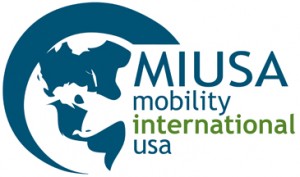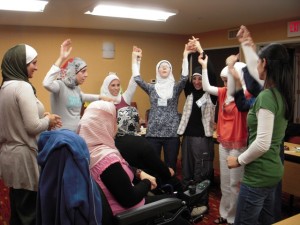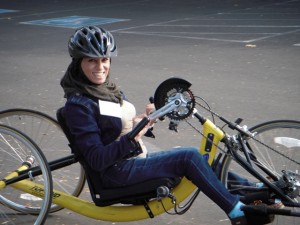The following guest post is written by Franz Knupfer, Project Coordinator at Mobility International USA. This is the second post in our series highlighting some of the inspirational work done by organizations in the fields of Disability and Accessibility, Cross-Cultural Dialogue, Journalism, and Diplomacy. The featured guest bloggers come from different NGOs, nonprofits, and organizations whose goals and efforts align with our mission.

For the last thirty years, Mobility International USA (MIUSA) has been working to empower people with disabilities around the world to achieve their human rights through international exchange and development. Our organization has done inbound and outbound exchanges all around the world, and this year, we have outbound programs to Spain, China and Jordan. In August, we will host the 6th International Women’s Institute on Leadership and Disability (WILD) program, which brings more than thirty women across a wide range of disabilities from around the world for intensive workshops and leadership training in Eugene, Oregon.
This September, nine women with disabilities from the United States will be going to Jordan for the second half of a reciprocal exchange which began last September, when nine women with disabilities came to the U.S. from Jordan. The Jordan exchange is funded and sponsored by the U.S. Department of State and all of the women are between the ages of 22 and 35. Last year, the Jordanian women took part in workshops in Eugene on inclusive education, networking with development agencies, women’s health, domestic violence, and other important issues. According to Shreen, who is deaf, “I have become a leader. I have acquired skills…to…make necessary changes in the lives of people with disabilities, and change the negative view of the society into a positive one.”

It’s exactly this kind of transformation that we seek in our work, because women with disabilities around the world often face tremendous attitudinal and societal barriers, especially in developing countries. In these countries, women with disabilities are becoming more aware of what is possible in terms of achieving full access, equality and human rights. For example, the delegation from Jordan believed that deaf women couldn’t be teachers in an inclusive classroom—until they had the opportunity to observe a deaf woman teach at an American school.
The Jordanian women had also learned from personal experience in their own country that children with disabilities are sent to special schools and not included in mainstream education. In Eugene, they saw a fully inclusive model where students with disabilities have access to the same education and opportunities as their non-disabled peers. “There is real integration in schools,” says Rasha, who is albino and has a visual disability. “Typical and disabled students are fully integrated. Seeing typical students accepting their disabled peers brings delight to the heart.”

Activities such as adaptive recreation and swimming allowed women from the Jordanian delegation to change what they’d previously believed was impossible for themselves into a reality. Many of them had never gone swimming or used a bicycle before. “When I grabbed the handlebars and rode the bicycle by myself, I felt I held the helm of life,” says Nadia M., who uses a wheelchair. “Now I can do anything I want by myself. I feel free, unconfined, and independent.”
American women with disabilities who participated in the program also had the opportunity to learn from their Jordanian counterparts, truly making it a reciprocal exchange. “They taught us about what it means to be a modern Muslim woman, where there is tradition and religion present in daily life,” says Megan Smith, who is Project Assistant at Mobility International USA and also has cerebral palsy. “However, they are very much like American women in terms of their desires, aspirations and goals.”
This September, when nine U.S. women with disabilities go to Amman, Jordan, they will contribute different areas of expertise including law, public health, deaf education, disability rights, working with youth and mothering with a disability. They will have the opportunity to be capacity builders and leaders, to learn about people with disabilities in Jordan, and to contribute by sharing what is truly possible when people with disabilities have full access to their community and their human rights.
To learn more about the Jordan program, pleas visit MIUSA’s website.
If you are a person with a disability interested in participating in international exchange between the U.S. and another country, the National Clearinghouse on Disability and Exchange (NCDE), which is also sponsored by the U.S. Department of State and administered by MIUSA, can provide information and assistance about access, accommodations, and a wide range of other disability-related issues.